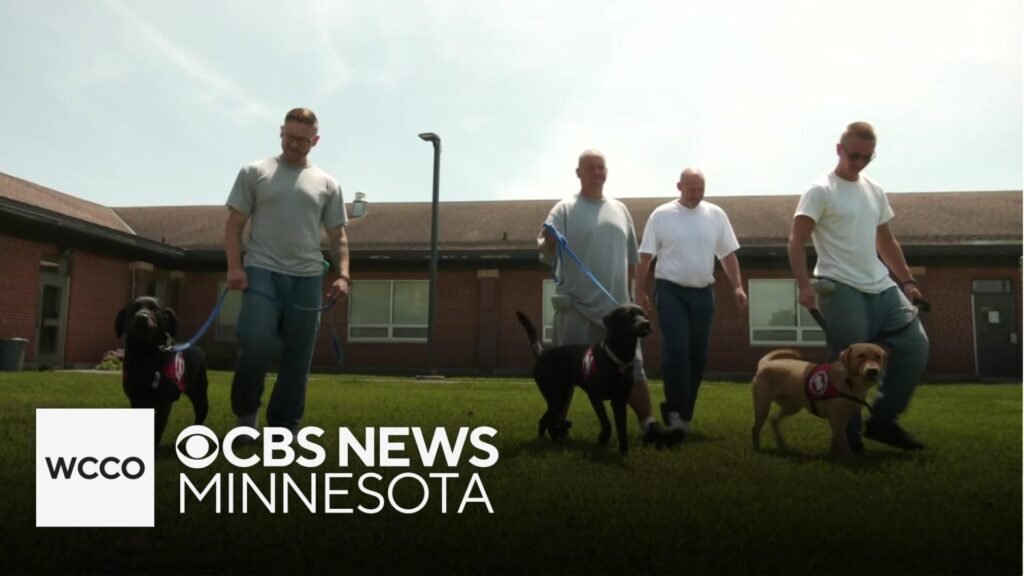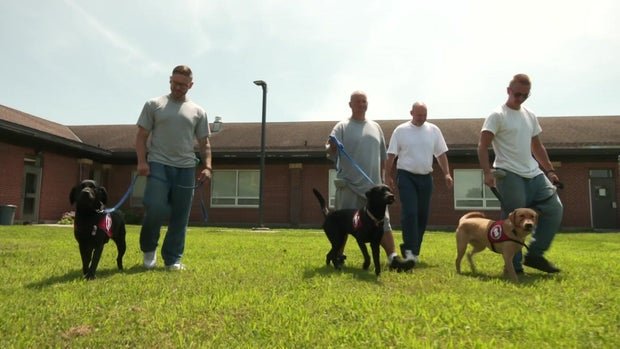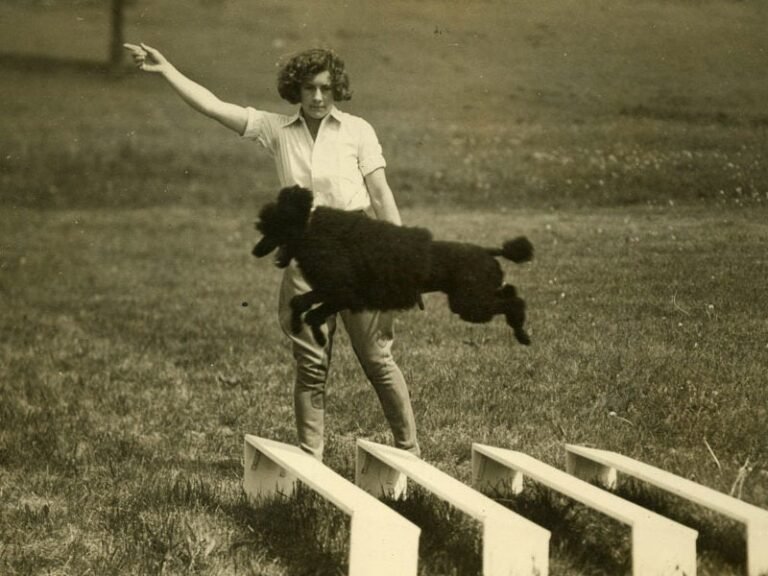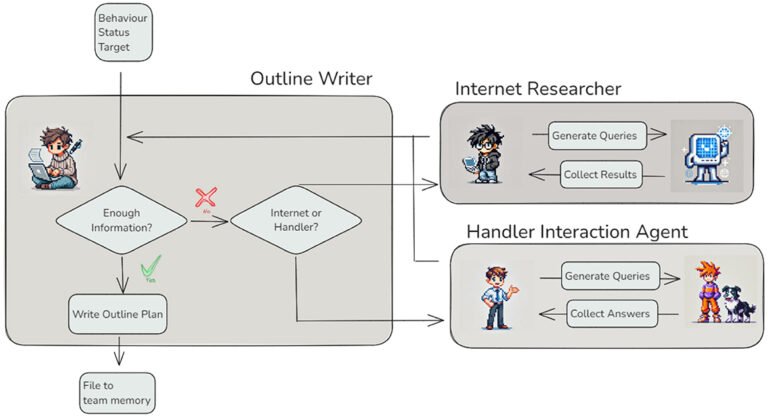Have you ever thought about the incredible bond between humans and dogs, or how that bond can change lives? In Minnesota, a unique program is turning inmates into loving caregivers, all while they train puppies to become assistance dogs. This heartwarming initiative combines rehabilitation for the inmates with life-changing training for the dogs, providing support for those in need. Let’s take a closer look at how this program works and the impact it has on everyone involved.

This image is property of assets1.cbsnewsstatic.com.
The Heart of the Program
At the Minnesota Correctional Facility in Faribault, a special program is transforming the lives of both inmates and dogs. In partnership with Can Do Canines, a New Hope-based assistance dog service, this initiative helps inmates learn valuable skills while nurturing puppies to grow into capable assistance animals. The program spans across several state and federal prisons in Minnesota and Wisconsin.
Connecting Through Care
Inmates in this program, such as LeNorris Drummond, find value in the connections they create with the puppies. Many inmates face loneliness and despair during their incarceration, but caring for a puppy provides them with companionship and a sense of purpose. “When I’m just lonely, I go in and you talk to him. He shakes his head a little bit, and he’s understanding me,” Drummond shares. It’s remarkable how these relationships can foster empathy and responsibility, traits that are vital for reintegration into society once they are released.
Personal Growth and Responsibility
Being part of this program allows inmates to reflect on their mistakes and take actionable steps toward personal growth. Drummond emphasizes the importance of responsibility: “To know when I get out, I have to have responsibility to take care of myself in order to transition and transform my life.” This mindset not only benefits the inmates but also positively influences their families and communities.
The Rigorous Selection Process
To become puppy handlers, inmates must undergo a comprehensive review process that proves they’re ready for this responsibility. This includes living in minimum security quarters, where they can enjoy greater freedom but must remain accountable for their actions.
Maintaining a Clean Environment
Corrections officer Mitchell Nagel oversees the program and stresses the importance of maintaining clean living spaces. The presence of a dog requires a clean environment, which mirrors the discipline and responsibility that inmates need to embrace. “I can look at their living space and see that it’s clean. That’s a huge thing,” explains Nagel. This approach fosters a sense of pride among the inmates and instills valuable life skills.

This image is property of assets1.cbsnewsstatic.com.
Training Puppies for a Purpose
The training process for these puppies is comprehensive and aimed at helping them become effective assistance dogs. The pups live with their inmate handlers, who take on the responsibility of teaching them basic commands, socialization skills, and even specialized tasks depending on the needs of their future human companions.
A Lifelong Journey
Once trained, these puppies are returned to Can Do Canines, where they undergo further evaluation before being placed with individuals in need. The bond formed between the inmates and the puppies is temporary, but it leaves a lasting impact on both parties. Inmates like Drummond find joy in nurturing and caring for the dogs, knowing that they will one day bring assistance and comfort to someone else.
The Unique Skills of Assistance Dogs
Assistance dogs play an essential role in helping individuals with disabilities lead more independent lives. They can be trained to assist with various tasks, including:
- Guiding those with vision impairments.
- Alerting individuals with hearing loss.
- Providing stability for people with mobility challenges.
With the extensive training these puppies receive from their inmate caregivers, they often become well-prepared to meet the specific needs of their future handlers.
The Ripple Effect
The effects of this program extend beyond the prison walls. When inmates are trained to care for puppies and understand the importance of responsibility, it leads to personal development that benefits their families and communities upon release.
Rebuilding Lives
Inmates like Drummond highlight how the program has allowed them to rebuild their lives. By fostering positive relationships with the puppies, they develop empathy, patience, and a sense of community. These qualities are essential for positive reintegration into society and often lead to better outcomes for both the individual and the community.

This image is property of assets2.cbsnewsstatic.com.
Can Do Canines: A Lifeline
Can Do Canines is not just a training organization; it’s a lifeline for many individuals in need. They rely on programs like the one at the Minnesota Correctional Facility to ensure they have a steady supply of well-trained assistance dogs. The organization handles all costs related to food, equipment, and training, allowing the inmates to participate without any burden on taxpayers.
Community Impact
This partnership between prisons and assistance dog organizations reflects a broader trend in community-driven rehabilitation efforts. It highlights the power of collaboration in addressing social issues and improving the lives of those involved. Not only does it offer inmates hope, but it also provides a valuable service to the community.
Challenges and Solutions
While the program boasts many successes, it does not come without challenges. Inmates face the struggle of adjusting to life after release and reintegrating into society while managing their past mistakes.
Addressing Recidivism
One of the significant goals of this program is to reduce recidivism rates. Studies indicate that engaging in programs that promote responsibility and provide skills leads to lower rates of re-offending. By teaching inmates the value of companionship and responsibility through dog training, Can Do Canines plays a pivotal role in breaking the cycle of incarceration.
Support for Transition
To help ease the transition, the program encourages ongoing support systems for inmates once they’re released. By building connections with community resources, such as job placement services and counseling, they can better navigate their re-entry into society.

This image is property of assets2.cbsnewsstatic.com.
The Future of the Program
As the program continues to thrive, there are plans for expansion. The success stories from Faribault and other facilities can inspire similar initiatives across the nation, providing hope and direction for countless individuals.
Training More Puppies
Increasing the number of puppies brought into training programs not only enriches the lives of inmates but also addresses the demand for assistance dogs. With more people reliant on these support animals, scaling the program makes a lot of sense.
Collaborating with Other Organizations
The future may also include partnerships with educational institutions and other nonprofits. Together, they can share resources, knowledge, and funding to maximize the program’s impact and drive future successes.
Personal Stories: A Glimpse Into Change
Hearing individual stories can offer profound insights into the life-changing impacts of this puppy training program. Inmates like Drummond have shared experiences that illustrate how nurturing a puppy has restored hope and purpose to their lives.
Building Strong Connections
Drummond’s bond with Racer showcases the emotional support that these pups can provide. As Drummond prepares to say goodbye to Racer, he reflects on the journey they’ve taken together. “The biggest thing is I have someone to take care of,” he expresses, emphasizing that this connection teaches him to be responsible and attentive.
Future Aspirations
Inmates often find motivation to pursue better futures through programs like this. Many express the desire to seek employment in fields related to animal care or rehabilitation, illustrating how their experiences can lead to positive life changes.

This image is property of assets3.cbsnewsstatic.com.
Final Thoughts
You might now see that the initiative in Minnesota is much more than just a program; it’s a movement toward empathy, personal growth, and community betterment. The bond forged between inmates and the puppies they train highlights the profound impact of caregiving and responsibility.
As this initiative continues to flourish, it carries the promise of transforming lives, reshaping futures, and ultimately contributing to stronger communities. Whether through the joyful wag of a tail or the heartfelt stories of change, the impact of training puppies to become assistance dogs resonates far beyond the prison walls, proving that connection and compassion can indeed uplift and heal.



